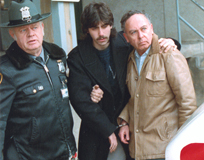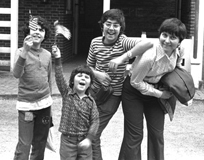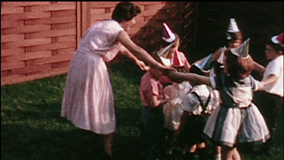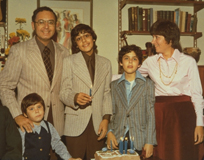Capturing the Friedmans (Andrew Jarecki, 2003)
 Andrew Jarecki’s documentary Capturing
the Friedmans, a lurid Sundance award winner, features footage of a wildly
dysfunctional clan that fortuitously (for the sake of the film) records their
private spats for posterity, offering the audience an almost unprecedented,
ethically questionable look at a real, live familial meltdown. Since the family
in question has two members that are on trial for child molestation, tensions
run high and tempers are short, making the footage sensational. Even though Capturing
is built around the inclusion of those recordings, it almost leaves the
household’s need to document their own lives and turn themselves into media
images totally unexamined. There's a brief speculation by one of the sons that the act of filming
his family's meltdown might have made experiencing them seem less real, but
they're still unwelcome in the same way that Michael Moore’s inclusion of footage
of the actual Columbine murders in Bowling For Columbine was. Even though the
family’s self-fulfilling desire to be stars is the most sickly fascinating
aspect of the film, seeing it come to fruition in this way is nearly nauseating. The family
obviously consented for Jarecki to use the footage. Presumably it was in hopes
of somehow exonerating themselves from the negative media scorn they’d
received. Coming to terms with their decision to give even more of themselves
over to the public seems inherent to understanding how they tick, but the fundamental
reasons of why they are willing to help Jarecki remain cloudy. Since the
criminal proceedings pushed the family’s private sexual behavior into the
public domain, perhaps there exists in them a feeling that no further violation
could be inflicted upon their privacy, or maybe the impulse arises out of their
desire to show the world that they have suffered too. Whatever the case, the footage doesn’t do much to further
understanding of the family and seems to exist mostly to satisfy a voyeuristic
demand in audience members that might feel that the crusade for truth and
justice entitles them to full access to the lives of those affected when a crime
is committed.
Andrew Jarecki’s documentary Capturing
the Friedmans, a lurid Sundance award winner, features footage of a wildly
dysfunctional clan that fortuitously (for the sake of the film) records their
private spats for posterity, offering the audience an almost unprecedented,
ethically questionable look at a real, live familial meltdown. Since the family
in question has two members that are on trial for child molestation, tensions
run high and tempers are short, making the footage sensational. Even though Capturing
is built around the inclusion of those recordings, it almost leaves the
household’s need to document their own lives and turn themselves into media
images totally unexamined. There's a brief speculation by one of the sons that the act of filming
his family's meltdown might have made experiencing them seem less real, but
they're still unwelcome in the same way that Michael Moore’s inclusion of footage
of the actual Columbine murders in Bowling For Columbine was. Even though the
family’s self-fulfilling desire to be stars is the most sickly fascinating
aspect of the film, seeing it come to fruition in this way is nearly nauseating. The family
obviously consented for Jarecki to use the footage. Presumably it was in hopes
of somehow exonerating themselves from the negative media scorn they’d
received. Coming to terms with their decision to give even more of themselves
over to the public seems inherent to understanding how they tick, but the fundamental
reasons of why they are willing to help Jarecki remain cloudy. Since the
criminal proceedings pushed the family’s private sexual behavior into the
public domain, perhaps there exists in them a feeling that no further violation
could be inflicted upon their privacy, or maybe the impulse arises out of their
desire to show the world that they have suffered too. Whatever the case, the footage doesn’t do much to further
understanding of the family and seems to exist mostly to satisfy a voyeuristic
demand in audience members that might feel that the crusade for truth and
justice entitles them to full access to the lives of those affected when a crime
is committed.
 Intercut throughout the home video
segments (which were filmed prior to 1988) are snippets of interviews that
Jarecki conducted more recently with the authorities involved in the case, the
Friedmans themselves, and a few
of the victims of the crimes. As the conflicting stories play against each
other, it becomes obvious that many are lying about, or at least remembering
incorrectly, the events that took place. A colleague of mine likened Jarecki’s
approach to Rashomon, in which a series of witnesses give different
accounts about a murder, but I think that Friedmans has less to say about
the nature of perspective than Kurosawa’s film because it lacks a controlled presence
like Kurosawa behind the lens. Jarecki is at least as interested in building
twists into his tale as he is in seeking out truth, but in order to do that, he
has to smudge the facts. His entire
aesthetic and narrative structure seem built around willful deception, precisely
so he can make it almost impossible accept anything with certainty. When he temporarily withholds information
from the audience such as the sexuality of father/pedophile Arnold’s brother
Howard (to either suggest he’s gay because he’s been molested as a child or,
worse yet, to suggest he’s untrustworthy somehow because he’s gay) or the
profession of Arnold’s son David (a clown for children’s parties) until it
can have maximum shock
value, it cheapens the enterprise immeasurably. This results in a thoroughly
unpleasant look at an unfortunate circumstance without much benefit of
enlightenment.
Intercut throughout the home video
segments (which were filmed prior to 1988) are snippets of interviews that
Jarecki conducted more recently with the authorities involved in the case, the
Friedmans themselves, and a few
of the victims of the crimes. As the conflicting stories play against each
other, it becomes obvious that many are lying about, or at least remembering
incorrectly, the events that took place. A colleague of mine likened Jarecki’s
approach to Rashomon, in which a series of witnesses give different
accounts about a murder, but I think that Friedmans has less to say about
the nature of perspective than Kurosawa’s film because it lacks a controlled presence
like Kurosawa behind the lens. Jarecki is at least as interested in building
twists into his tale as he is in seeking out truth, but in order to do that, he
has to smudge the facts. His entire
aesthetic and narrative structure seem built around willful deception, precisely
so he can make it almost impossible accept anything with certainty. When he temporarily withholds information
from the audience such as the sexuality of father/pedophile Arnold’s brother
Howard (to either suggest he’s gay because he’s been molested as a child or,
worse yet, to suggest he’s untrustworthy somehow because he’s gay) or the
profession of Arnold’s son David (a clown for children’s parties) until it
can have maximum shock
value, it cheapens the enterprise immeasurably. This results in a thoroughly
unpleasant look at an unfortunate circumstance without much benefit of
enlightenment.
 Remarkable as the presence of such
footage is, watching the Friedmans as they bicker doesn’t do much to explain
the film's central questions, so it feels somewhat pointless for the director to take that approach. Jarecki
alludes to a dubious questioning process on the part of the police during the
initial investigation (easier to show them as scapegoats, I guess…), but never
presents evidence of those actual testimonies that might confirm or deny those
claims. In doing this, he simultaneously undermines the idea that he's attempting to give a
comprehensive look at the case and in doing that, eliminates the best defense as to why he's
included the home videos. When the camera finally leaves the home, it’s almost absurd that more
energy is spent damning the appropriately concerned parents of the molested
children than skewering the admitted molester. Such a stance might seem
provocative or appear “fair” to someone distanced from the situation, but to
those involved in it that aren't named Friedman, it must seem disgusting. Since Jarecki can’t prove the
innocence of the admitted pedophile Arnold, when he lends screen time to those
who suggest mass hysteria is the main culprit behind the charges, it seems an
affront to Arnold’s victims. Even if, as Arnold claims to his wife, there were
only infrequent bouts of molestation, the real tragedy is that his Great Neck
community got torn apart during the witch-hunt. Ironically, Jarecki frequently
suggests that society is the villain of the piece, not only by signifying one
should fear their neighbors and including mocking shots of handsomely manicured
lawns, but also by ridiculing the town’s attempts to mobilize as one to
deal with the crisis. The lack of attention paid to the non-Friedman families
that were surely torn apart by this tragedy feels inappropriate but is indicative
of the film's general apathy toward most of this incident's victims. The
innocent Friedmans are not contemptuous, but the child victims, the confused parents, and
the people who weren't involved in this
mess, but still have to live in the devastated Great Neck, are just as worthy of Jarecki’s attention as the Friedmans. Largely
ignoring them is a grievous crime of omission.
Remarkable as the presence of such
footage is, watching the Friedmans as they bicker doesn’t do much to explain
the film's central questions, so it feels somewhat pointless for the director to take that approach. Jarecki
alludes to a dubious questioning process on the part of the police during the
initial investigation (easier to show them as scapegoats, I guess…), but never
presents evidence of those actual testimonies that might confirm or deny those
claims. In doing this, he simultaneously undermines the idea that he's attempting to give a
comprehensive look at the case and in doing that, eliminates the best defense as to why he's
included the home videos. When the camera finally leaves the home, it’s almost absurd that more
energy is spent damning the appropriately concerned parents of the molested
children than skewering the admitted molester. Such a stance might seem
provocative or appear “fair” to someone distanced from the situation, but to
those involved in it that aren't named Friedman, it must seem disgusting. Since Jarecki can’t prove the
innocence of the admitted pedophile Arnold, when he lends screen time to those
who suggest mass hysteria is the main culprit behind the charges, it seems an
affront to Arnold’s victims. Even if, as Arnold claims to his wife, there were
only infrequent bouts of molestation, the real tragedy is that his Great Neck
community got torn apart during the witch-hunt. Ironically, Jarecki frequently
suggests that society is the villain of the piece, not only by signifying one
should fear their neighbors and including mocking shots of handsomely manicured
lawns, but also by ridiculing the town’s attempts to mobilize as one to
deal with the crisis. The lack of attention paid to the non-Friedman families
that were surely torn apart by this tragedy feels inappropriate but is indicative
of the film's general apathy toward most of this incident's victims. The
innocent Friedmans are not contemptuous, but the child victims, the confused parents, and
the people who weren't involved in this
mess, but still have to live in the devastated Great Neck, are just as worthy of Jarecki’s attention as the Friedmans. Largely
ignoring them is a grievous crime of omission.
 What scant bits of information that Capturing
does include about the victimization of the children is inadequate to allow
the filmmaker to ask the audience to begin making judgments about these people,
so the idea that truth is an issue at all seems absurd.
The interviews with alleged victims are so inanely glib that it’s tough to
imagine they're indicative of the average witness or even piece together the details of the alleged molestations. When compared with
the slobbering attention Jarecki pays to every detail of the initial discovery of
kiddie porn in the Friedman house, his examination of the heinous allegations that ended
up jailing both father and son comes up short. When Jarecki is essentially
forced into revealing
Arnold’s admissions of wrongdoing, and the film shifts attention to the question Jesse’s
innocence alone, much of the previous speculation and conspiracy theory is
rendered moot. It’s poor, beleaguered, willfully blind mother Elaine that
seems the most believable throughout. During her interview, she seems so traumatized
and exhausted by the ordeal that
she seems to have been stripped of every defense mechanism, including deceit. When this
unfortunate series of incidents essentially frees her from her family, the film
offers its only glimmer of hope. Otherwise, it seems to exist mostly to destroy faith in the
legal system and encourage the audience to distrust their communities. The fictionalized HBO movie Indictment: The McMartin Trial
dealt with similar material yet was infinitely more moving to me, perhaps
because my concerns about that film's treatment of the victims weren’t as acute.
Despite the title of this film, due to the lack of insight into the bigger picture
surrounding their case, the Friedmans remain elusive when the film has ended.
Obviously easy answers aren't desirable here, but what we get instead of answers
is less an examination of the unknowable truth than a document that, much like
the denial-stricken members of the Friedman clan, seems to have become so
clouded by bias that it refuses to look for the truths in front of it.
What scant bits of information that Capturing
does include about the victimization of the children is inadequate to allow
the filmmaker to ask the audience to begin making judgments about these people,
so the idea that truth is an issue at all seems absurd.
The interviews with alleged victims are so inanely glib that it’s tough to
imagine they're indicative of the average witness or even piece together the details of the alleged molestations. When compared with
the slobbering attention Jarecki pays to every detail of the initial discovery of
kiddie porn in the Friedman house, his examination of the heinous allegations that ended
up jailing both father and son comes up short. When Jarecki is essentially
forced into revealing
Arnold’s admissions of wrongdoing, and the film shifts attention to the question Jesse’s
innocence alone, much of the previous speculation and conspiracy theory is
rendered moot. It’s poor, beleaguered, willfully blind mother Elaine that
seems the most believable throughout. During her interview, she seems so traumatized
and exhausted by the ordeal that
she seems to have been stripped of every defense mechanism, including deceit. When this
unfortunate series of incidents essentially frees her from her family, the film
offers its only glimmer of hope. Otherwise, it seems to exist mostly to destroy faith in the
legal system and encourage the audience to distrust their communities. The fictionalized HBO movie Indictment: The McMartin Trial
dealt with similar material yet was infinitely more moving to me, perhaps
because my concerns about that film's treatment of the victims weren’t as acute.
Despite the title of this film, due to the lack of insight into the bigger picture
surrounding their case, the Friedmans remain elusive when the film has ended.
Obviously easy answers aren't desirable here, but what we get instead of answers
is less an examination of the unknowable truth than a document that, much like
the denial-stricken members of the Friedman clan, seems to have become so
clouded by bias that it refuses to look for the truths in front of it.
* *
06-01-03
Jeremy Heilman